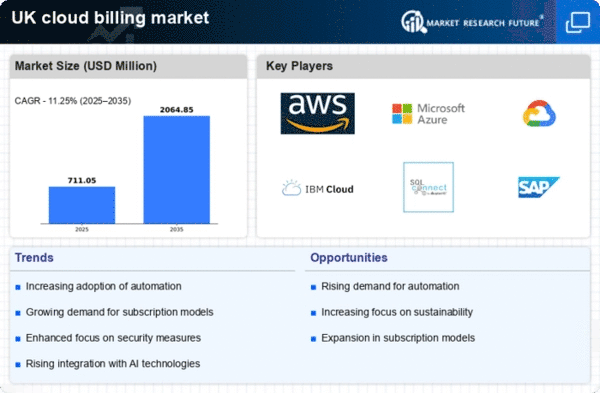Increased Focus on Cost Efficiency
Cost efficiency remains a critical driver in the cloud billing market. UK businesses are increasingly recognising the financial advantages of cloud-based billing systems, which can reduce operational costs associated with traditional billing methods. By leveraging cloud technology, organisations can minimise the need for extensive IT infrastructure and personnel, leading to significant savings. Reports indicate that companies can save up to 30% on billing-related expenses by transitioning to cloud solutions. This financial incentive is compelling many firms to adopt cloud billing systems, thereby driving market expansion. Furthermore, as competition intensifies, the emphasis on cost-effective solutions is likely to encourage innovation among service providers, resulting in more competitive pricing and enhanced features in the cloud billing market.
Growing Regulatory Compliance Requirements
The cloud billing market is increasingly influenced by growing regulatory compliance requirements in the UK. As businesses face stricter regulations regarding data protection and financial reporting, the demand for compliant billing solutions is on the rise. Cloud billing systems that offer robust compliance features are becoming essential for organisations aiming to avoid penalties and maintain customer trust. The UK government has implemented various regulations, such as GDPR, which necessitate stringent data handling practices. Consequently, cloud billing providers are focusing on developing solutions that not only meet these compliance standards but also enhance transparency and accountability. This trend is likely to drive the adoption of cloud billing systems, as companies seek to align their operations with regulatory expectations.
Expansion of E-commerce and Digital Services
The expansion of e-commerce and digital services is significantly impacting the cloud billing market. As more businesses in the UK transition to online platforms, the need for efficient billing solutions has become paramount. E-commerce companies require billing systems that can handle high transaction volumes and provide real-time analytics to optimise sales strategies. The UK e-commerce market is projected to reach £200 billion by 2025, which underscores the growing demand for cloud billing solutions tailored to this sector. This trend is prompting cloud billing providers to enhance their offerings, ensuring they can meet the specific needs of e-commerce businesses. Consequently, the cloud billing market is likely to experience robust growth as it aligns with the evolving landscape of digital commerce.
Rising Demand for Flexible Billing Solutions
The cloud billing market in the UK is experiencing a notable surge in demand for flexible billing solutions. Businesses are increasingly seeking systems that can accommodate various pricing models, including pay-as-you-go and subscription-based services. This shift is driven by the need for agility in financial management, allowing companies to adapt to changing market conditions. According to recent data, the UK cloud billing market is projected to grow at a CAGR of 15% over the next five years. This growth is indicative of a broader trend where organisations prioritise financial flexibility, enabling them to optimise cash flow and enhance customer satisfaction. As a result, providers of cloud billing solutions are innovating to offer more adaptable and user-friendly platforms, which is likely to further stimulate market growth.
Technological Advancements in Billing Systems
Technological advancements are playing a pivotal role in shaping the cloud billing market. Innovations such as machine learning and advanced analytics are being integrated into billing systems, enabling businesses to gain deeper insights into customer behaviour and billing patterns. These technologies facilitate more accurate forecasting and improved revenue management, which are crucial for financial planning. As organisations in the UK increasingly adopt these advanced billing solutions, the market is expected to witness substantial growth. Furthermore, the integration of APIs and other connectivity features allows for seamless integration with existing enterprise systems, enhancing operational efficiency. This technological evolution is likely to attract more businesses to the cloud billing market, as they seek to leverage these advancements for competitive advantage.
















